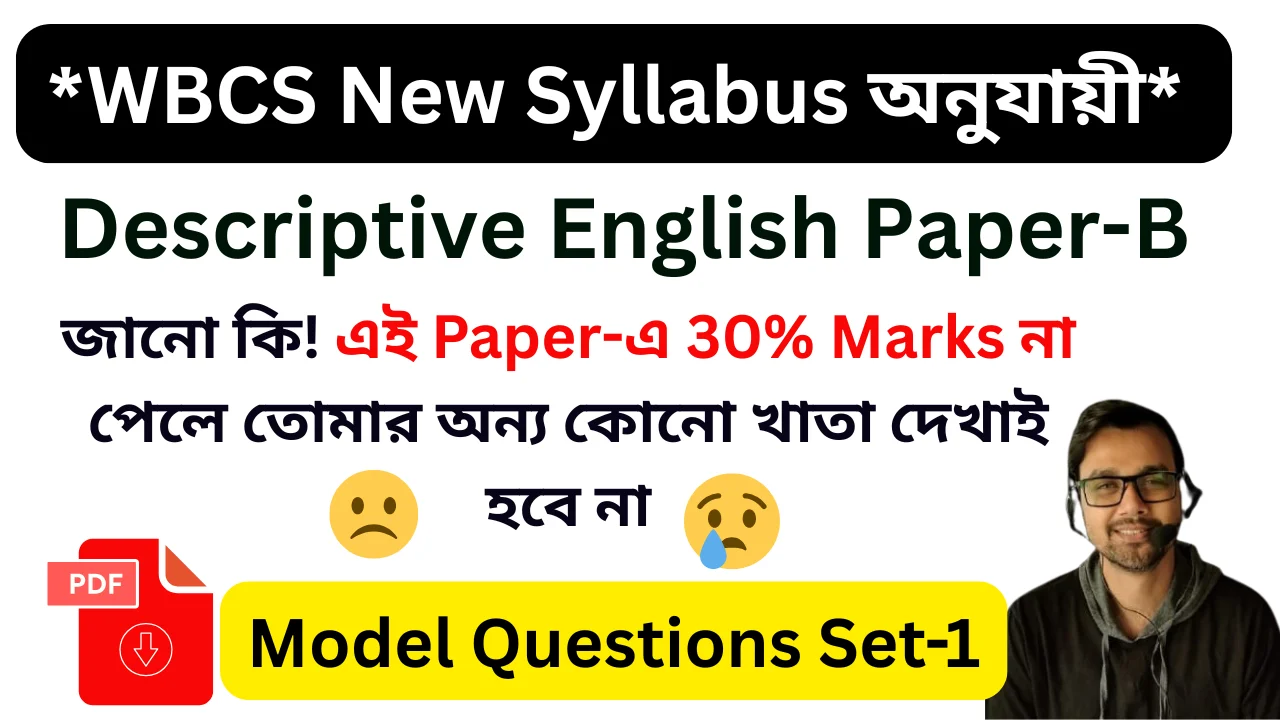WBCS Mains Paper-B – English Language
Time Allowed: 3 Hours
Maximum Marks: 300
Instructions:
- All questions are compulsory.
- Answers must be written in English.
- Adhere to the word limit specified.
- Clarity, coherence, and precision will be rewarded.
A deduction of 10% of full marks shall be made from the total marks secured by a candidate in a particular paper if he/she discloses his/her identity by writing his/her name, roll number, or by putting any identifying mark in the answer script of that paper.
Section A – Comprehension
(60 Marks)
Read the passage and answer the following questions:
“In the age of artificial intelligence and rapid technological evolution, the concept of ‘work’ is being redefined. Automation, once seen as a threat to employment, is now viewed as a partner to productivity. This transformation requires both the workforce and policy frameworks to evolve. As routine tasks are increasingly managed by machines, human capabilities like creativity, empathy, and strategic thinking gain unprecedented importance. Governments, educators, and industry leaders must collaborate to ensure that skills development keeps pace with innovation. A society that prepares its citizens for change, rather than resisting it, will thrive in this new era of human-machine collaboration.”
Questions:
- What is the central idea of the passage? (6 Marks)
- How has the perception of automation changed over time? (6 Marks)
- What is expected of governments and educators in this context? (6 Marks)
- Explain the importance of human capabilities as discussed. (6 Marks)
- Suggest a suitable title and justify it. (6 Marks)
- Summarize the passage in about 120 words. (30 Marks)
Section B – Precis Writing
(60 Marks)
Read the passage below and write a precis in about 100 words.
- Give your precis a suitable title.
- Avoid quoting directly from the passage.
- Aim to preserve the essence and logical flow of the original.
Environmental concerns have become central to discussions of global development. As the world continues to urbanize and industrialize, the environmental costs of progress have become increasingly clear. Issues such as air and water pollution, climate change, loss of biodiversity, and deforestation have emerged as consequences of unchecked growth. Although the link between economic development and environmental degradation is well-established, meaningful action to reverse these trends remains slow and uneven across regions.
One key challenge lies in balancing immediate economic interests with long-term ecological goals. Governments are often pressured to prioritize economic growth, employment, and infrastructure development, even at the expense of environmental sustainability. Environmental policies, when implemented, may lack enforcement or be diluted by political and corporate influence. Furthermore, developing nations frequently argue that they should not be constrained by environmental standards not followed by developed countries during their industrialization.
Sustainable development presents a way forward by aiming to meet current needs without compromising future generations. This model requires integration of environmental thinking into policymaking, education, corporate practices, and individual behavior. Green technology, renewable energy, and circular economies are essential tools, but require substantial investment, innovation, and cooperation.
Public awareness and citizen participation play a vital role in holding institutions accountable and ensuring policy implementation. The role of the media, educational institutions, and civil society becomes especially important in promoting environmental literacy and activism. Without a strong environmental ethic across all layers of society, laws and treaties alone will not suffice.
Ultimately, the transition to a more sustainable world demands a collective shift in priorities, recognizing that economic growth and environmental stewardship are not mutually exclusive but fundamentally interdependent. Passage (Approx. 300 words):
Section C – Usage and Vocabulary
(60 Marks)
A. Correct the following sentences (1.5 marks each): (7.5 Marks)
- The committee have reached their decision.
- He is more elder than his brother.
- Neither of the players have arrived.
- She gave me an advice.
- He did not knew the answer.
B. Fill in the blanks with appropriate words (1.5 marks each): (7.5 Marks)
- The scientist was known for his ___ in handling complex data.
- Her comments were so ___ that they sparked an intense debate.
- The new policy aims to ___ inequality in access to education.
- The diplomat managed to ___ the crisis with calm negotiation.
- The teacher encouraged students to develop a ___ of reading.
C. Use the following words in sentences (3 marks each): (15 Marks)
- Resilience
- Mitigate
- Perception
- Expedite
- Ambiguous
D. Give synonyms and antonyms for the following (4 marks each): (20 Marks)
- Concise
- Arduous
- Discreet
- Inevitable
- Prolific
Section D – Short Essay
(60 Marks)
Write an essay of about 400–450 words on any one of the following:
- The Role of Language in National Integration
- Social Media and Its Impact on Civil Discourse
- Balancing Development with Environmental Sustainability
- The Challenge of Communal Harmony in a Diverse Democracy
Section E – Letter Writing / Report Drafting
(60 Marks)
Write any one of the following (400–500 words):
A. You are the District Education Officer. Write a formal letter to the Secretary of the Education Department suggesting improvements in the quality of online education in government schools.
OR
B. Draft a report on implementing the “Clean India” campaign in your district, highlighting achievements, challenges, and recommendations.
Whatsapp: 7872728272
